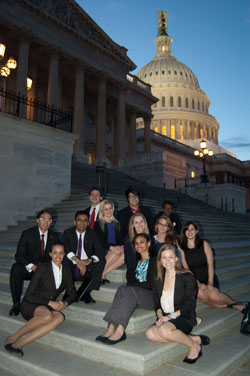
When Sarah Shaw’s father passed away from lung cancer in the summer of 2009, she faced financial difficulties that threatened to derail her future years of study at Rutgers.
“I was terrified,” she said. “I didn’t think I was going to be able to come back. For someone who was 19 at the time, I felt very lost.” Shaw had qualified for financial aid when she enrolled in Rutgers, but with the loss of her father, a single parent, every penny of that aid would be essential.
Shaw’s was one of several personal stories that federal legislators and staff members heard Tuesday, when twelve Rutgers students spent the afternoon on Capitol Hill meeting with New Jersey’s congressional delegation. Their mission was to advocate for continued federal student aid, including Pell Grants that nearly one in three Rutgers students rely on to fund their education.
And while they shared statistics about the cost of education and how grants, loans and work-study programs help cover those costs, the students knew the real reason they were there – to put faces with the issues that legislators are asked to deal with.
“My story hit their hearts,” Shaw said. “They realize there’s a problem and are trying to address it.”
Shaw went on to tell about how the following year, she qualified as an independent student – defined as someone who receives no financial support from a parent or other relative. That bumped her Pell grant up by $100 and qualified her for a larger subsidized student loan. She succeeded in overcoming personal and financial crisis, but she continues to rely on money she makes at her jobs.
“Financial aid still doesn’t cover the full term bill, but I’m thankful for anything I get,” said the School of Arts and Sciences senior and president of the Rutgers University Programming Association.
The students were pleased that legislators and staff members generally agreed with the Rutgers message to preserve financial aid. However, the students did not feel like they were “preaching to the choir.”

Representative Rush Holt, right, whose 12th Congressional District includes part of the New Brunswick campus, discusses student financial aid with a group of Rutgers students including Valerie Weiss and Matt Cordeiro.
“There were a few instances where our message was questioned,” said Pamela Navrot, a School of Arts and Sciences freshman majoring in neuroscience. “But that means they were engaged. They walked us through some of the problems, mainly in the appropriations process.”
With fierce partisan battles in Congress over balancing the budget, students were pleased to hear support from Republicans and Democrats. They know additional funding, while always needed, is unlikely in today’s budgetary and political climate, but they emphasized the importance of financial stability. Specifically, they voiced opposition to doubling subsidized loan interest rates, scheduled to take place automatically in July if Congress doesn't act beforehand.
“For me, a thousand dollars more is a big difference,” said Jenna Cantarella, a senior at Rutgers-Camden. “It’s not just three percent.” A few staffers told her they’d look into legislation opposing the increase.
And a congressman told Matt Cordeiro, a School of Arts and Sciences senior, that he would look into the issue of student loan forgiveness and possibly cosponsor a bill.
“With student loan debt reaching one trillion dollars and college costs at an all-time high, we can’t put off the problem,” said Cordeiro. “It showed me that the more their constituents are passionate, the more they respond.”
Suresh Nathan, a senior biomedical engineering major who is interested in attending medical school, cast financial support as an issue of national investment.
“We want people to pursue even higher levels of education to make America competitive,” said Nathan. “You have to have finances from your undergraduate years under control if you plan to go on to graduate school.”
Cordeiro echoed Nathan’s thoughts. “We need to invest in our future, and investing in students is investing in our future.”


